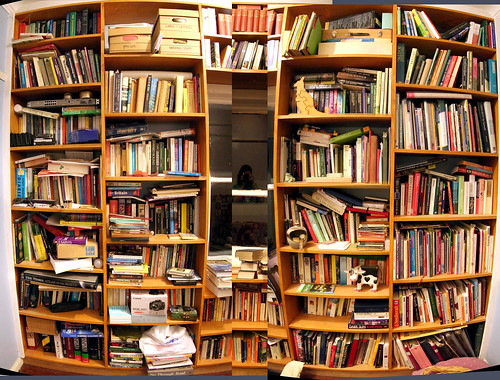I hope that many of you had the watch the PBS program
Frontline: Growing Up Online last Tuesday. If you didn't, you can watch it online. The
blogosphere is certainly awash in discussions regarding the show. There are a number of thoughts that came to mind as I watched the show. I am going to focus on what I see are the implications to education, in particular school libraries and teacher librarians.
I thought that the education portion of the documentary was very reflective of the teacher digital divide that is currently in many schools. We certainly have many teachers who are embracing new technologies because they see this as a way of engaging their students. We have teachers who I think would be amenable to delving into new ways of student engagement but find that accessing the technology is too difficult for a variety of reasons - mostly because the technology is unavailable when they need it (labs are booked) or when they have made arrangements, there are 'technical difficulties' and student time on task is wasted while problems are trying to be fixed. Then of course we have teachers who are either intimidated by technology or not interested in doing anything different.
How do teachers encourage this participation? How can we use the tools that students have access to as part of our classrooms? How can we take advantage of this media saturated world to engage students? And not just our best students but all students. One of the reasons that we have behavior issues with some of our applied level students is they are not engaged. They tend to be very social - we need to tap in to this characteristic and develop learning strategies and activities that take advantage of their social, media-saturated world - through technology like podcasts, videocasts and social tools like wikis and blogs. Every classroom should be equipped with SMARTBoards, computers and Internet access. Every school library should be equipped with a media production area.
Steve Maher was the history teacher interviewed in this documentary. On the interview page on the PBS website, he talks about the shift away from content to process, i.e. the processes of critical evaluation of information and the skills necessary to know how to access information efficiently. He says:
How many times have I seen students wasting time looking for information by simply googling a topic? And then finding totally inappropriate sites and not having the skills to evaluate the content on the page? As teacher librarians, we can help students by partnering with teachers to follow a research process that includes skills lessons in narrowing topics, developing search strategies, teaching tricks to help evaluate web sites and directing students to online databases. There are many strategies that we can use with students to help them. There are excellent resources to help us do this (our own resources Imagine the Learning, Research Success @ your library, Reality Check as well as a number of web-based resources):
http://www.sbhsd.k12.ca.us/sbhslib/reading/choosing.htm
http://www.accessola.com/osla/toolkit/intro.html
Maher also said in the documentary that we need to re-think plagiarism and what constitutes plagiarism. In this I disagree. What we need to do is to redesign the hunt and gather type of project and challenge students with projects that have them use the information they found. We need to make the research process transparent by requiring students to check in at various points along the way through the use of conferencing, blogging or wikis. I've linked two resources that show how blogs and wikis can be part of the research process.
David Loertscher has some excellent publications that show how to design projects that require students to evaluate, synthesize and analyze information. I've included a link to a page on his site - Ban the Bird Unit Action Research Project.
Loertscher's excellent books Ban Those Bird Units and Beyond Bird Units can be purchased through the OLA Store.










No comments:
Post a Comment